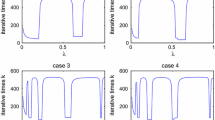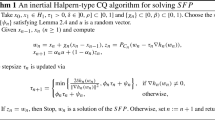Abstract
In this paper, by combining the inertial technique and the gradient descent method with Polyak’s stepsizes, we propose a novel inertial self-adaptive gradient algorithm to solve the split feasibility problem in Hilbert spaces and prove some strong and weak convergence theorems of our method under standard assumptions. We examine the performance of our method on the sparse recovery problem beside an example in an infinite dimensional Hilbert space with synthetic data and give some numerical results to show the potential applicability of the proposed method and comparisons with related methods emphasize it further.
Similar content being viewed by others
References
Alvarez, F., Attouch, H.: An inertial proximal method for maximal monotone operators via discretization of a nonlinear oscillator with damping. Set-Valued Anal., 9, 3–11 (2001)
Ansari, Q. H., Rehan, A.: Split feasibility and fixed point problems. In: Ansari, Q. (eds), Nonlinear Analysis. Trends in Mathematics. Birkhäuser, New Delhi, 2014, pp. 281–322
Aubin, J. P.: Optima and Equilibria: An Introduction to Nonlinear Analysis, Springer, 1993
Byrne, C.: Iterative oblique projection onto convex sets and the split feasibility problem. Inverse Problems, 18, 441–453 (2002)
Byrne, C.: A unified treatment of some iterative algorithms in signal processing and image reconstruction. Inverse Problems, 20, 103–120 (2004)
Ceng, L. C., Ansari, Q. H., Yao, J. C.: An extragradient method for solving split feasibility and fixed point problems. Comput. Math. Appl., 64, 633–642 (2012)
Ceng, L. C., Ansari, Q. H., Yao, J. C.: Relaxed extragradient methods for finding minimum-norm solutions of the split feasibility problem. Nonlinear Anal., 75, 2116–2125 (2012)
Censor, Y., Elfving, T.: A multiprojection algorithm using Bregman projection in a product space. Numer. Algor., 8, 221–239 (1994)
Censor, Y., Bortfeld, T., Martin, B., et al.: A unified approach for inversion problems in intensity modulated radiation therapy. Phys. Med. Biol., 51, 2353–2365 (2006)
Censor, Y., Elfving, T., Kopf, N., et al.: The multiple-sets split feasibility problem and its applications for inverse problems. Inverse Problems, 21, 2071–2084 (2005)
Dang, Y., Gao, Y.: The strong convergence of a KM-CQ-like algorithm for a split feasibility problem. Inverse Problems, 27, Art. ID 015007, 9 pp. (2011)
Dang, Y., Sun, J., Xu, H. K.: Inertial accelerated algorithms for solving a split feasibility problem. J. Indust. Manage. Optim. 13, 1383–1394 (2017)
Dong, Q. L., He, S., Rassias, M. T.: General splitting methods with linearization for the split feasibility problem. J. Global Optim., 79, 813–836 (2021)
Gibali, A., Mai, D. T., Vinh, N. T.: A new relaxed CQ algorithm for solving split feasibility problems in Hilbert spaces and its applications. J. Indust. Manage. Optim., 15, 963–984 (2019)
Goebel, K., Reich, S.: Uniform Convexity, Hyperbolic Geometry, and Nonexpansive Mappings, Marcel Dekker, New York and Basel, 1984
Kesornprom, S., Pholasa, N., Cholamjiak, P.: On the convergence analysis of the gradient-CQ algorithms for the split feasibility problem. Numer. Algor., 84, 997–1017 (2020)
Lopez, G., Martfn-Marquez, V., Wang, F., Xu, H. K.: Solving the split feasibility problem without prior knowledge of matrix norms. Inverse Problems, 28, Art. ID 085004, 18 pp. (2012)
Ma, X., Liu, H.: An inertial Halpern-type CQ algorithm for solving split feasibility problems in Hilbert spaces. J. Appl. Math. Comput., 68, 1699–1717 (2022)
Mainge, P. E.: Approximation methods for common fixed points of nonexpansive mappings in Hilbert spaces. J. Math. Anal. Appl., 325, 469–479 (2007)
Mainge, P. E.: Strong convergence of projected subgradient methods for nonsmooth and nonstrictly convex minimization. Set-Valued Anal., 16, 899–912 (2008)
Opial, Z.: Weak convergence of the sequence of successive approximations for nonexpansive mappings. Bull. Amer. Math. Soc., 73, 591–597 (1967)
Polyak, B. T.: Introduction to Optimization, Optimization Software, New York, 1987
Qu, B., Xiu, N.: A note on the CQ algorithm for the split feasibility problem. Inverse Problems, 21, 1655–1665 (2005)
Suantai, S., Pholasa, N., Cholamjiak, P.: The modified inertial relaxed CQ algorithm for solving the split feasibility problems. J. Indust. Manage. Optim., 14, 1595–1615 (2018)
Takahashi, W.: The split feasibility problem in Banach spaces. J. Nonlinear Convex Anal., 15, 1349–1355 (2014)
Tan, K. K., Xu, H. K.: Approximating fixed points of nonexpansive mappings by the Ishikawa iteration process. J. Math. Anal. Appl., 178, 301–308 (1993)
Wang, F., Xu, H. K.: Cyclic algorithms for split feasibility problems in Hilbert spaces. Nonlinear Anal., 74, 4105–4111 (2011)
Wang, F.: Polyak’s gradient method for split feasibility problem constrained by level sets. Numer. Algor., 77, 925–938 (2018)
Xu, H. K.: Iterative algorithms for nonlinear operators. J. Lond. Math. Soc., 66, 240–256 (2002)
Xu, H. K.: Iterative methods for the split feasibility problem in infinite-dimensional Hilbert spaces. Inverse Problems, 26, Art. ID 105018, 17 pp. (2010)
Yang, Q.: The relaxed CQ algorithm for solving the split feasibility problem. Inverse Problems, 20, 1261–1266 (2004)
Zhao, J., Yang, Q.: Self-adaptive projection methods for the multiple-sets split feasibility problem. Inverse Problems, 27, Art. ID 035009 (2011)
Acknowledgements
The authors would like to thanks the editor and the referee for valuable remarks and helpful suggestions which improved the quality of the paper. This research is funded by University of Transport and Communications (UTC) under Grant Number T2023-CB-001.
Author information
Authors and Affiliations
Corresponding author
Ethics declarations
Conflict of Interest The authors declare no conflict of interest.
Rights and permissions
About this article
Cite this article
Vinh, N.T., Hoai, P.T., Dung, L.A. et al. A New Inertial Self-adaptive Gradient Algorithm for the Split Feasibility Problem and an Application to the Sparse Recovery Problem. Acta. Math. Sin.-English Ser. 39, 2489–2506 (2023). https://doi.org/10.1007/s10114-023-2311-7
Received:
Revised:
Accepted:
Published:
Issue Date:
DOI: https://doi.org/10.1007/s10114-023-2311-7




